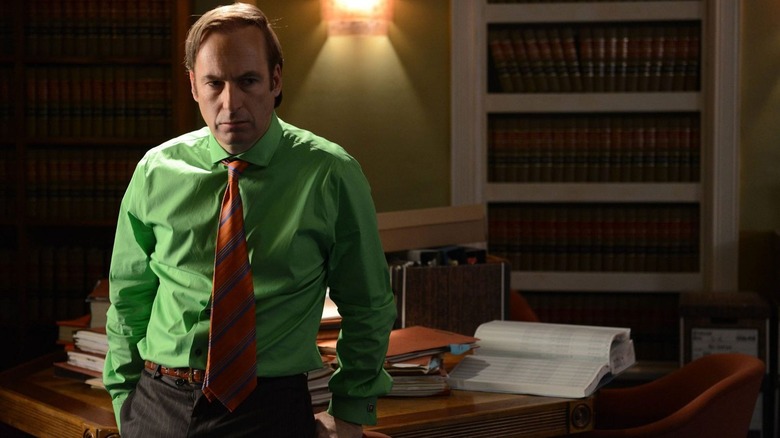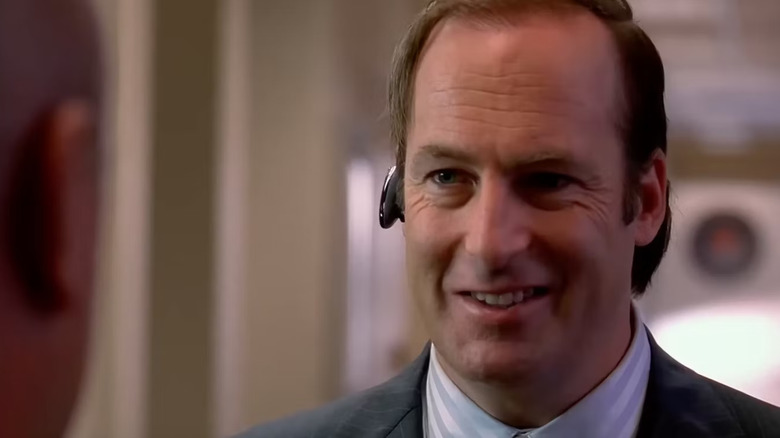AMC
In the ruthless world of “Breaking Bad,” the survival of a character was never a certainty. The show’s creator, Vince Gilligan, and his team of writers often contemplated the death of key characters. For instance, they initially planned to kill off Jesse (Aaron Paul) in the first season and even considered killing Skyler (Anna Gunn) in the fifth season. However, the series would have been drastically different without Jesse, the true essence of the show. The idea of killing him off would have been a significant error, and Skyler’s death would have been superfluous. Fortunately, the writers made the right decision and spared both characters.
During the planning of the final season and the grand finale, another character was on the brink of death: Saul Goodman, portrayed by Bob Odenkirk. Saul is one of the show’s most beloved characters, even earning his prequel series, “Better Call Saul.” His death would have had a significant impact on the show and its fanbase. It’s fortunate that he was spared, but what led Gilligan to contemplate killing him?
In an interview with Entertainment Weekly in 2014, Gilligan shed light on why he almost killed Saul and why he decided to kill Walt (Bryan Cranston) instead. It’s intriguing to imagine how different “Breaking Bad” and “Better Call Saul” could have been.
Saul Goodman’s Near-Death Experience in the Breaking Bad Finale

AMC
The writers of “Breaking Bad” were torn between creating a “bloodbath” ending or something more subdued. Gilligan once mentioned that they had considered “killing off every major character” in a “‘Wild Bunch’ bloodbath of an ending.” However, they eventually toned it down, realizing that although it would be dramatic, it wouldn’t necessarily serve the storyline. In Saul’s case, they recognized that it wouldn’t suit his character. As Gilligan explains:
“Saul Goodman is akin to a cockroach, in that he’s likely to survive all nuclear wars and still be out there somewhere after humanity has been wiped out. He’s a survivor, so it would be odd if he didn’t survive. Walter White, on the other hand, received a death sentence in the first act of the very first episode. If he didn’t die at the end, it would perhaps be less than satisfying.”
Walt’s death at the end of the series was crucial to complete his character arc, even if it was the one moment that brought Gilligan to tears. But when it came to Saul, there were other significant factors besides his cockroach-like survival skills.
Why Saul Goodman Was Spared

AMC
Gilligan confessed that the impact Saul’s death would have on “Better Call Saul” was “probably a factor” in their decision to keep him alive. However, the more significant issue was that they couldn’t find a compelling reason or method to kill him. There wasn’t that defining moment when they all agreed on the perfect way to eliminate Saul that would be meaningful and narratively satisfying. So he thought, “Why bother?”
He also noted that their involvement in “Better Call Saul” didn’t guarantee a character’s survival in “Breaking Bad.” For instance, Mike (Jonathan Banks) played a significant role in the prequel series despite being killed off in the fifth season of “Breaking Bad.” Characters appear throughout “Breaking Bad,” “Better Call Saul,” and the sequel film “El Camino,” with many dying on-screen in “Breaking Bad” before appearing in “Better Call Saul.” (If you’re confused about the timelines, don’t worry, we’ve got a guide for that.)
I’m relieved they didn’t kill off Saul as it would have cast a shadow over “Better Call Saul,” which is a fantastic series. And as Gilligan said, Saul’s a survivor, a cockroach, the kind of guy that wouldn’t fall because of Walter White.
Credit: www.slashfilm.com


